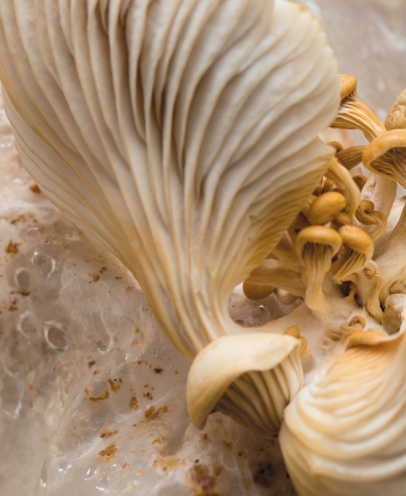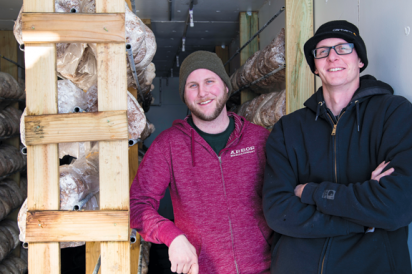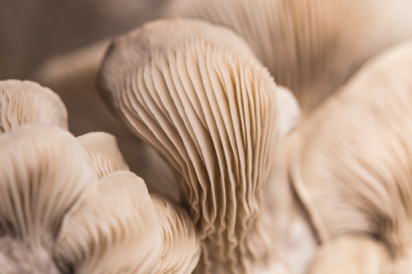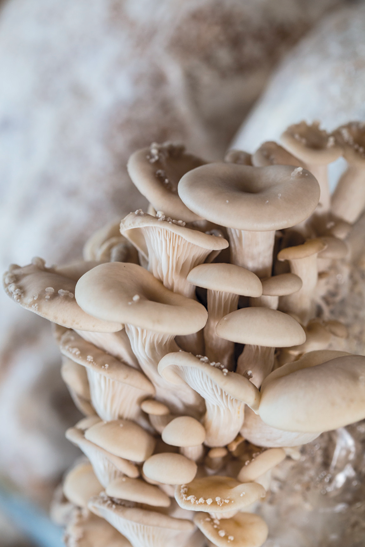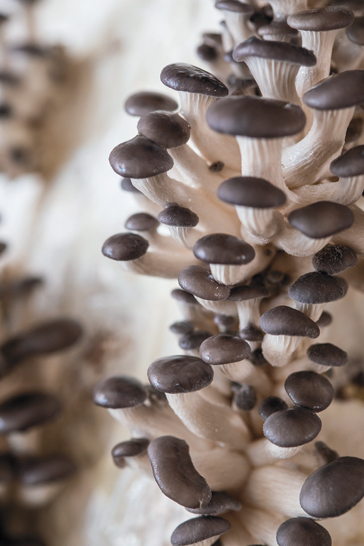Business is Mushrooming at the Detroit Mushroom Company
Off a rural road in Northfield Township, a stone’s throw from South Lyon, the only sign that anything is happening on an 80-acre stretch of farmland is three shipping containers— the Conex tractor-trailer kind—and a couple of pickup trucks. Detroit Mushroom Company’s digs are so unassuming that describing them as “unassuming” seems overstated.
“When we meet the neighbors they always start with ‘We always wonder …’ ‘Yeah, I bet you do,’” says co-owner Brian McShane, who along with partner Randen Syjut knows what it might look like.
This isn’t “Breaking Bad.” And these aren’t your grandma’s mushrooms. Inside one container, cinder-block-sized bags of substrate stacked floor to ceiling on narrow shelves fill each wall. From the spawn bags, mushrooms reach out like flowers in wall pockets. McShane reads a mushroom’s carpophore or cap to determine the optimum moment to pick it.
“You really want to get them before the caps have turned up. You want to get them when they’re clam shaped—half the oyster. You get a lower yield, but a higher-quality mushroom,” he says. In the moderately cool room for about a month, the mushrooms act like a wick, drawing up the nutrients and moisture in what begins as a five-pound bag.
The pair get about two to four pickings before the bag is spent and discarded weighing closer to two and a half pounds after much of the substrate matter turns to CO2—its uptake by the mushrooms expiring into the air. McShane and Syjut time it to empty and refill one wall a week.
“No manure here,” says Syjut. They don’t grow mushrooms in the dark either. Instead, hardwood sawdust amended with an array of organic nutrients is the basis for growing varieties of oyster and shiitake mushrooms, pioppino, beech and lion’s mane.
“You are what you eat,” says McShane. “You can grow mushrooms that are really starchy or you can grow mushrooms that are loaded with good stuff. In this mixture, the mushrooms grow better and at the end of the day they yield a better product with nutrients going into your body.”
Plus, gourmet mushrooms are often thought of as medicinal too, says McShane, pointing to lion’s mane which many consider a brain food. “They’re really good for you. They’re anti-inflammatory, rich in polysaccharides, which are touted as building blocks of the mind. These help build those neurons,” he says.
McShane and Syjut didn’t crack the mushroom-growing code overnight. They’ve worked at it for about nine years and most seriously since 2012. It started when McShane noticed how area groceries carried mushrooms from Pennsylvania and Ontario, but none locally grown, so he began researching the process.
It took him two years to rope Syjut into his “sham” with the promise of big bucks to be had. The two met after both signed on to film a live reenactment of The Rocky Horror Picture Show in Toledo. The gig was a bust—the worst days of his life, says McShane—but they got their friendship out of the deal and eventually Detroit Mushroom. They began growing mushrooms in Syjut’s dad’s backyard, but the hobby quickly elevated to hobby-obsession and outgrew the space and into a business they wanted to take seriously.
“We didn’t start this like a business. We took a dollar and made a dollar,” Syjut says. “When it comes to mushrooms, it doesn’t matter what you read.”
What money they made, they spent on research and development, testing growing methods before settling on shipping containers where the floors gently slant inward to drain excess water in the middle.
“It only took us two grow rooms to figure that out. The simplest things become the bane of your existence,” says Syjut, the “MacGyver” of the operation, explaining that the two designed everything themselves.
“Luckily, Randen knows a little bit about everything,” says McShane. “Each problem became a challenge. We’ve blown through 100 large in research and development. At this point we know what we’re talking about and what we’re doing.”
Today the mushrooms “pay for the party,” says McShane, with a wholesale business that supplies Argus Farm Stops in Ann Arbor along with about a dozen restaurants, including Arbor Brewing Co. in Ypsilanti, where McShane doubles as a bartender.
“The people who buy from us have been wildly supportive,” says McShane, who counts several creative and innovative chefs as regular customers reliant on their mushrooms. “It’s a pat on the shoulder when they send you a picture of their final product.”
Brandon Johns, chef and owner of Grange Kitchen & Bar in Ann Arbor, says he takes whatever they have available. “We use their mushrooms all the time,” says Johns. “I love the fact that they started this company. It was a hole that needed to be filled in the local food environment. They’re super consistent and good with the different mushrooms they’ve produced.”
Now Detroit Mushroom Co. plans to double production by summer. Another partner, Philip Neumeier, will soon market mushroom extracts he created and ramp up an e-commerce arm with products that help other growers. And eventually McShane and Syjut hope to revisit their entertainment roots to captivate audiences with lighthearted educational videos about mushrooms.
“There’s a food renaissance going on right now. People are moving to the area and there are a lot of people paying attention to good food lately,” McShane says.
Learn more at DetroitMushroom


